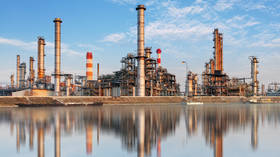Russia and India set new record in oil trade

Exports of Russian oil to India reached a new record in May, Bloomberg reported on Wednesday citing ship tracking data.
Moscow accounted for 46% of India's total oil imports last month, a "staggering leap" from the less than 2% mark imported prior to Western restrictions on purchases of Russian crude, data from analytics firm Kpler showed.
Shipments from India's traditional Middle Eastern suppliers lagged behind Moscow as New Delhi snapped up Russian oil at hefty discounts, following a $60-per-barrel price cap imposed by Western nations.
In April, the average cost of Russian crude delivered to India totaled $68.21 a barrel, while Saudi oil stood at $86.96, the outlet said.
"Granted, China too has taken far more Russian crude over the past year, with imports hitting records, but it is India, a strategic US partner, that has stepped in from the wings to prop up the Russian economy," Bloomberg noted.
However, the outlet pointed out that not all Indian refineries were ready to boost Russian oil supplies as these plants were not designed to process heavier blends of crude.
"The BPCL refinery in Mumbai, for example, doesn't have a coker — a unit that allows the processing of heavier, sulfurous crude like Russia's — so about a tenth of the crude processed is Russian," an executive at one refinery told the outlet. This is lower than at some of India's newer plants, where the figure is as high as 40%.
While refinery configuration remains a limiting factor, "right pricing" of oil and capital investment inflows to upgrade the infrastructure could change the situation within three or four years, the outlet said.
"Indian refiners took the far, far high end and beyond of what we thought would be possible," said Jamal Qureshi, Managing Director for Strategy and Analysis at Petro-Logistics. "They quickly replaced Urals lookalike grades, which we expected, but they've also backed out of other grades beyond that."
In March, Russia's largest oil producer, Rosneft, signed an agreement with Indian Oil Corp, the country’s top refiner, to substantially increase oil supplies and diversify oil grades delivered to the country.
Moscow and New Delhi also agreed to use the Asia-focused Dubai oil price benchmark in their latest deal, abandoning the Europe-focused Brent benchmark as Moscow shifts oil sales towards Asia.
For more stories on economy & finance visit RT's business section













